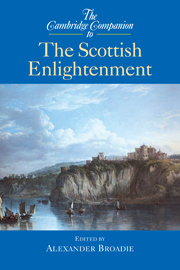Book contents
- Frontmatter
- Introduction
- 1 The contexts of the Scottish Enlightenment
- 2 Religion and rational theology
- 3 The human mind and its powers
- 4 Anthropology: the ‘original’ of human nature
- 5 Science in the Scottish Enlightenment
- 6 Scepticism and common sense
- 7 Moral sense and the foundations of morals
- 8 The political theory of the Scottish Enlightenment
- 9 Economic theory
- 10 Natural jurisprudence and the theory of justice
- 11 Legal theory
- 12 Sociality and socialisation
- 13 Historiography
- 14 Art and aesthetic theory
- 15 The impact on Europe
- 16 The impact on America: Scottish philosophy and the American founding
- 17 The nineteenth-century aftermath
- Select bibliography
- Index
1 - The contexts of the Scottish Enlightenment
Published online by Cambridge University Press: 28 May 2006
- Frontmatter
- Introduction
- 1 The contexts of the Scottish Enlightenment
- 2 Religion and rational theology
- 3 The human mind and its powers
- 4 Anthropology: the ‘original’ of human nature
- 5 Science in the Scottish Enlightenment
- 6 Scepticism and common sense
- 7 Moral sense and the foundations of morals
- 8 The political theory of the Scottish Enlightenment
- 9 Economic theory
- 10 Natural jurisprudence and the theory of justice
- 11 Legal theory
- 12 Sociality and socialisation
- 13 Historiography
- 14 Art and aesthetic theory
- 15 The impact on Europe
- 16 The impact on America: Scottish philosophy and the American founding
- 17 The nineteenth-century aftermath
- Select bibliography
- Index
Summary
There is no single context for the Scottish Enlightenment but there are several which were important. Let us start with the most basic, Scotland's geography, which made Scots poor but which also endowed them with the means of improvement and posed questions which the enlightened studied and sought to answer.
Of Scotland's 30,000 square miles less than 10 per cent was arable land in the eighteenth century. Somewhat more was comprised of grazing land of varying quality (more or less 13 per cent) and perhaps 3 per cent made up forest which was cuttable; perhaps a bit more was usable in some fashion. The possible uses of this land were determined by altitude, by the kinds of soils, and by the micro-climates, of which Scotland has many. Scotland was and would remain a poor country. Agricultural improvement, to produce both more food and the materials for industries (such as wool), was a concern which was recognised in the seventeenth century and grew in importance throughout the eighteenth century.
Physical geography informed the country’s prospects in other ways. Scotland has long coastlines and Scots were an ocean-going people, but the river systems they possessed were not as useful for inland navigation as were those in England or France because of the short distances to the fall lines.
- Type
- Chapter
- Information
- Publisher: Cambridge University PressPrint publication year: 2003
- 9
- Cited by



